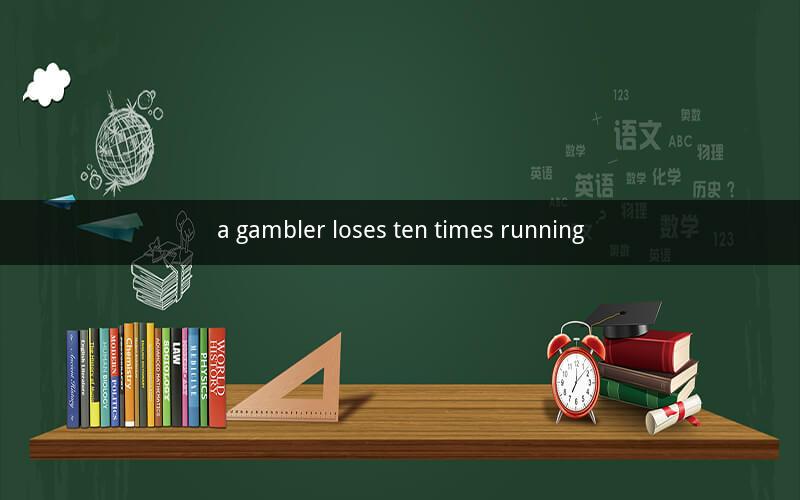
A Gambler Loses Ten Times Running: Understanding the Psychology Behind the Loss
Table of Contents
1. Introduction to Gambling
2. The Psychology of Risk and Reward
3. The Role of Expectancy and Probability
4. The Impact of Emotions on Decision-Making
5. The Concept of Gambler's Fallacy
6. The Role of Habituation in Persistent Losses
7. Coping with Persistent Losses
8. Strategies for Responsible Gambling
9. Conclusion
1. Introduction to Gambling
Gambling is a form of entertainment that involves betting money or valuable items on an uncertain event. It is a universal activity that has been present in various forms throughout human history. From ancient civilizations to modern societies, gambling has always been a source of excitement and controversy.
2. The Psychology of Risk and Reward
The psychology behind gambling is rooted in the human desire for risk and the potential for reward. People are naturally drawn to activities that offer a chance to win big, even if the odds are stacked against them. This psychological drive can lead individuals to engage in gambling despite the potential for financial and emotional consequences.
3. The Role of Expectancy and Probability
Gambling involves calculating probabilities and determining the expected value of an outcome. However, individuals often have a distorted perception of probabilities and may overestimate their chances of winning. This skewed expectation can lead to persistent losses, as gamblers continue to chase a desired outcome without considering the actual likelihood of it occurring.
4. The Impact of Emotions on Decision-Making
Emotions play a significant role in gambling behavior. Excitement, anxiety, and the thrill of the chase can cloud judgment and lead individuals to make irrational decisions. The intense emotional rollercoaster experienced during gambling can create a strong desire to continue playing, even in the face of repeated losses.
5. The Concept of Gambler's Fallacy
The gambler's fallacy is a cognitive bias that leads individuals to believe that a random event is more likely to occur after a series of unlikely outcomes. For example, if a gambler keeps losing at a slot machine, they may believe that a win is imminent. This fallacy is based on the misconception that past events can influence future outcomes, which is not the case in random events.
6. The Role of Habituation in Persistent Losses
Persistent losses can lead to habituation, where individuals become desensitized to the negative consequences of their gambling behavior. This desensitization can make it difficult for individuals to recognize the need for change and may lead to an increase in gambling activity, despite ongoing losses.
7. Coping with Persistent Losses
Coping with persistent losses requires a combination of self-awareness, self-control, and support. It is important for individuals to recognize the signs of problem gambling and seek help if necessary. This can involve setting limits on gambling activities, seeking therapy or counseling, and building a support network of friends and family.
8. Strategies for Responsible Gambling
Responsible gambling involves making informed decisions and setting personal boundaries. Some strategies for responsible gambling include:
- Setting a budget and sticking to it
- Knowing when to stop, even if there is a chance to win
- Avoiding gambling in situations where emotions may be heightened
- Seeking out resources and support for responsible gambling
9. Conclusion
A gambler who loses ten times running may be experiencing a combination of psychological factors, including a skewed perception of probabilities, emotional bias, and the influence of habituation. Understanding these factors can help individuals recognize the need for change and develop strategies for responsible gambling.
Questions and Answers
1. What is the main psychological drive behind gambling?
- The main psychological drive behind gambling is the desire for risk and the potential for reward.
2. How can emotions affect gambling behavior?
- Emotions such as excitement, anxiety, and the thrill of the chase can cloud judgment and lead to irrational decision-making.
3. What is the gambler's fallacy, and why is it problematic?
- The gambler's fallacy is the misconception that past events can influence future outcomes in random events, which is not true.
4. How can habituation contribute to persistent losses?
- Habituation can desensitize individuals to the negative consequences of gambling, making it difficult for them to recognize the need for change.
5. What are some strategies for responsible gambling?
- Some strategies for responsible gambling include setting a budget, knowing when to stop, avoiding emotionally charged situations, and seeking support.
6. How can individuals cope with persistent losses?
- Individuals can cope with persistent losses by building self-awareness, practicing self-control, and seeking support from friends, family, or professionals.
7. What are the potential consequences of problem gambling?
- The potential consequences of problem gambling include financial loss, emotional distress, and strained relationships.
8. How can individuals recognize the signs of problem gambling?
- Signs of problem gambling may include lying about gambling activities, borrowing money to gamble, feeling anxious or irritable when not gambling, and neglecting responsibilities.
9. What resources are available for individuals struggling with problem gambling?
- Resources for individuals struggling with problem gambling include therapy, counseling, support groups, and helplines.
10. Why is it important to seek help for problem gambling?
- Seeking help for problem gambling is important because it can lead to a better understanding of the problem and provide individuals with the tools and support needed to overcome it.